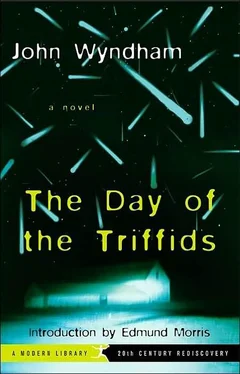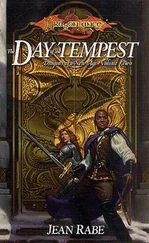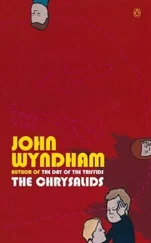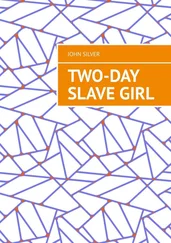This time a number of broken triffids lay in the gap. Our impression was that they had been crushed in the pressure that had been built up against the fence before it gave way, and that, falling with it, they had been trampled by the rest.
It was clear that we should have to take new defensive measures. No part of our fence was any stronger than that which had given way. Electrification seemed the most likely means of keeping them at a distance. To power it, I found an army generator mounted on a trailer and towed it home. Susan and I set to work on the wiring. Before we had completed it the brutes were through again in another place.
I believe that system would have been completely effective if we could have kept it in action all the time—or even most of the time. But against that there was the fuel consumption. Gas was one of the most valuable of our stores. Food of some kind we could always hope to grow, but when gasoline and Diesel oil were no longer available, much more than our mere convenience would be gone with them. There would be no more expeditions, and consequently no more replenishment-s of supplies. The primitive life would start in earnest So, from motives of conservation, the barrier wire was charged for only a few minutes two or three times a day. It caused the triffids to recoil a few yards, and thereby stopped them building up pressure against the fence. As an additional guard we ran an alarm wire on the inner fence to enable us to deal with any breaks before they became serious.
The weakness lay in the triffids’ apparent ability to learn, in at least a limited way, from experience. We found, for in-stance, that they grew accustomed to our practice of charging the wire for a while night and morning. We began to notice that they were usually clear of the wire at our customary time for starting the engine, and they started to close in again soon after it had stopped. Whether they actually associated the charged condition of the wire with the sound of the engine was impossible to say then, but later we had little doubt that they did.
It was easy enough to make our running times erratic, but Susan, for whom they were continually a source of inimical study, soon began to maintain that the period for which the shock kept them clear was growing steadily shorter. Nevertheless, the electrified wire and occasional attacks upon them in the sections where they were densest kept us free of incursions for over a year, and of those that occurred later we had warning enough to stop them being more than a minor nuisance.
Within the safety of our compound we continued to learn about agriculture, and life settled gradually into a routine.
On a day in the summer which began our sixth year Josella and I went down to the coast together, traveling there in the half-tracked vehicle that I customarily used now that the roads were growing so bad. It was a holiday for her. Months had passed since she had been outside the fence. The cares of the place and the babies had kept her far too tied to make more than a few necessary trips, but now we had reached the stage where Susan could safely be left in charge sometimes, and we had a feeling of release as we climbed up and ran over the tops of the hills. On the lower southern slopes we stopped the car for a while, and sat there.
It was a perfect June day, with only a few light clouds flecking a pure blue sky. The sun shone down on the beaches and the sea beyond just as brightly as it had in the days when those same beaches had been crowded with bathers and the sea dotted with little boats. We looked on it in silence for some minutes. Josella said:
“Don’t you still feel sometimes that if you were to close your eyes for a bit you might open them again to find it all as it was, Bill?.. I do.”
“Not often now,” I told her. “But I’ve had to see so much more of it than you have. All the same, sometimes—”
“And look at the gulls—just as they used to be!”
“There are many more birds this year,” I agreed. “I’m glad of that.”
Viewed impressionistically from a distance, the little town was still the same jumble of small red-roofed houses and bungalows populated mostly by a comfortably retired middle class—but it was an impression that could not last more than a few minutes. Though the tiles still showed, the walls were barely visible. The tidy gardens had vanished under an unchecked growth of green, patched in color here and there by the descendants of carefully cultivated flowers. Even the roads looked like strips of green carpet from this distance. When we reached them we should find that the effect of soft verdure was illusory; they would be matted with coarse, tough weeds.
“Only so few years ago,” Josella said reflectively, “people were wailing about the way those bungalows were destroying the countryside. Now look at them!”
“The countryside is having its revenge, all right,” I said. “Nature seemed about finished then—’Who would have thought the old man to have had so much blood in him?’”
“It rather frightens me. It’s as if everything were breaking out. Rejoicing that we’re finished, and that it’s free to go its own way. I wonder? Have we been just fooling ourselves since it happened? Do you think we really are finished with, Bill?”
I’d had plenty more time when I was out on my foragings to wonder about that than she had.
“If you weren’t you, darling, I might make an answer out of the right heroic mold—the kind of wishful thinking that so often passes for faith and resolution.”
“But I am me?”
“I’ll give you the honest answer—not quite. And while there’s life, there’s hope.”
We looked on the scene before us for some seconds in silence.
“I think,” I amplified, “only think, mind you, that we have a narrow chance—so narrow that it is going to take a long, long time to get back. If it weren’t for the triffids, I’d say there was a very good chance indeed—though still taking a longish time. But the triffids are a real factor. They are something that no rising civilization has had to fight before. Are they going to take the world from us, or are we going to be able to stop them?
‘The real problem is to find some simple way of dealing with them. We aren’t so badly off—we can hold them away. But our grandchildren—what are they going to do about them? Are they going to have to spend all their lives in human reservations kept free of triffids only by unending toil?
“I’m quite sure there is a simple way. The trouble is that simple ways so often come out of such complicated research. And we haven’t the resources.”
“Surely we have all the resources there ever were, just for the taking,” Josella put in.
“Material, yes. But mental, no. What we need is a team, a team of experts really out to deal with the triffids for good and all. Something could be done, I’m sure. Something along the lines of a selective killer, perhaps. If we could produce the right hormones to create a state of imbalance in triffids but not m other things… It must be possible—if you have enough brain power turned onto the job.”
“If you think that, why don’t you try?” she asked.
“Too many reasons. First, I’m not up to it—a very mediocre biochemist, and there’s only one of me. There’d have to be a lab, and equipment. More than that, there’d have to be time, and there are too many things which I have to do as it is. But even if I had the ability, then there would have to be the means of producing synthetic hormones in huge quantities. it would be a job for a regular factory. But before that there must be the research team.”
“People could be trained.”
“Yes—when enough of them can be spared from the mere business of keeping alive. I’ve collected a mass of biochemical books in the hope that perhaps sometime there will be people who can make use of them—I shall teach David all I can, and
Читать дальше











